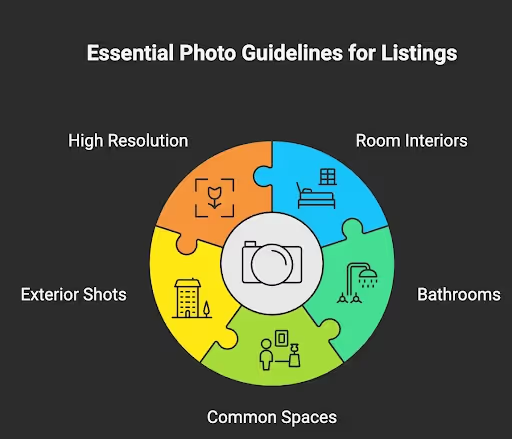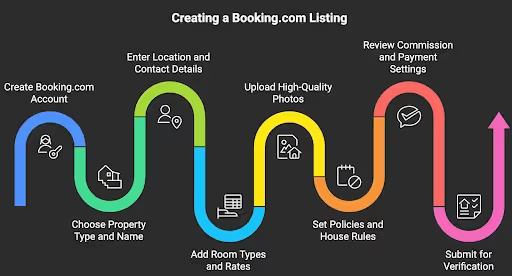Table of Contents
Join Thousands of Hotels Thriving with roommaster
The transition to roommaster is straightforward and efficient. Our implementation team handles data migration including reservations, guest profiles, and historical information.
Listing a hotel online can make it visible to travelers from around the world. Booking.com is one of the most popular platforms for hotels, apartments, and other accommodations.
This guide explains the process to list on Booking.com, including registration requirements, setup steps, and how to manage a listing. Whether managing a small guesthouse or a larger property, understanding this process can help maximize online presence.
This information is designed for those new to online travel agencies (OTAs) and hotel distribution. Each section breaks down the steps in clear language.
Booking.com connects properties with travelers in over 220 countries. The platform gets more than 1.5 billion visits each month, giving hotels access to a massive global audience.
The commission-based model means properties pay a percentage only when guests actually book and stay. There are no upfront fees to create a booking com listing or monthly subscription costs.
Many travelers recognize the Booking.com brand, which can increase trust in your property. Your listing appears in search results alongside established hotels, giving smaller properties equal visibility.
Key benefits include:

Getting your information ready before starting saves time during the registration process. Booking.com asks for specific details about your property, policies, and business information.
High-quality photos are the most important part of your listing. Travelers decide whether to book based largely on what they see in your photo gallery.
Take photos of every room type you plan to list. Include bathrooms, common areas like lobbies or breakfast rooms, and your property's exterior. Each photo needs to be at least 1024 x 683 pixels.
Photo requirements:
Clear policies prevent guest confusion and disputes. Booking.com requires specific information about check-in procedures, cancellation terms, and property rules.
Document your check-in and check-out times, pet policies, smoking rules, and any age restrictions. Include details about additional fees like cleaning charges or security deposits.
You'll provide business bank account details for receiving payments. Booking.com also collects tax identification numbers as required by local regulations.
Prepare documentation proving you own or legally manage the property. This might include business licenses, property deeds, or management agreements.

Go to join.booking.com and click "List your property." Enter your email address, create a password, and provide basic contact information including your name and phone number.
Booking.com allows one property owner per account initially. If you manage multiple properties, you can add them later through the same account.
Select your property category from the available options. Hotels fall under "Hotel, B&B & More" while vacation rentals use "Homes" or "Apartments."
Enter your property name exactly as it appears on your business registration or signage. Avoid creative spellings or marketing language that might confuse travelers searching for your hotel.
Input your complete street address including postal code. Booking.com uses this information to place your property accurately on maps and in location-based searches.
Add your primary phone number and email address. These become the main contact methods for both Booking.com and guests who book your property.
Location accuracy matters because:
Create separate listings for each type of room you offer. A small hotel might have standard doubles, king rooms, and suites as different room types.
Set your base rate for each room category. This becomes your starting price, which you can adjust later based on demand, seasons, or special events.
Include what's covered in your room rate, such as breakfast, Wi-Fi, or parking. Booking.com displays this information to help travelers compare options.
Start with your best room photo as the main image. This appears first in search results and significantly impacts booking decisions.
Upload at least 24 photos showing different angles and areas of your property. Include wide shots that show room layouts and close-ups highlighting amenities or decor details.
Photo strategy:
Define your cancellation policy using Booking.com's standard options. Most hotels choose flexible (free cancellation until 1-2 days before arrival) or moderate (free cancellation until 5-7 days before).
Specify check-in and check-out times, extra person fees, and policies about children or pets. Clear policies reduce guest complaints and help set proper expectations.
Booking.com typically charges 15-18% commission on each booking, though rates vary by location and property type. This commission gets deducted from your earnings, not charged upfront.
Choose between two payment options: Payments by Booking.com (they collect from guests and pay you) or self-processing (you charge guests directly and pay Booking.com commission separately).
Review all your information before submitting. Booking.com checks your property details, photos, and ownership documentation during their approval process.
Verification usually takes 24-72 hours. Once approved, your property goes live and starts appearing in search results. You'll receive login details for the Extranet dashboard to manage your listing.

Understanding how Booking.com makes money helps you plan your pricing and cash flow. The platform uses a commission-based model rather than charging upfront listing fees.
Most properties pay 15-18% commission on each completed booking. The exact rate depends on your location, property type, and participation in Booking.com's programs like Genius or mobile deals.
Commission applies only to bookings where guests actually arrive and check in. If someone books but doesn't show up, you don't pay commission on that reservation.
Payments by Booking.com means the platform collects payment from guests and transfers your earnings minus commission. This reduces administrative work but gives you less control over payment timing.
Self-processing means you charge guests directly using your own payment system. You then pay Booking.com commission separately through monthly invoicing. This option requires more setup but gives you direct control over transactions.
With Payments by Booking.com, you typically receive money within 24 hours of guest check-in. Self-processing properties receive monthly invoices for commission owed.
All financial details appear in your Extranet dashboard under the Finance tab. You can download statements and track earnings by month, room type, or booking source.
Managing availability across multiple booking platforms requires careful coordination. Double bookings happen when two different sites sell the same room for the same night.
iCal syncing shares availability information between Booking.com and other platforms through calendar feeds. When someone books on one site, the calendar updates automatically on connected platforms.
Basic iCal sync has limitations. Updates can take several hours, and some changes don't transfer correctly between different booking systems.
A property management system like roommaster automate calendar syncing across all your booking channels. When someone books on Booking.com, the system immediately blocks those dates on your direct booking website, Expedia, and other connected platforms.
Channel manager benefits:
{{channel-manager-one}}
Getting your property live on Booking.com is just the beginning. Several strategies can improve your search ranking and booking conversion rate.
Booking.com assigns each property a content score based on how complete and detailed your listing information is. Higher content scores typically correlate with better search visibility.
Complete all available fields in your property profile, including detailed descriptions, amenities lists, and policy information. Add photos of every room type and common area.
Keep your availability calendar updated at least weekly. Properties with accurate, current availability information rank higher in search results.
Mobile rates offer small discounts to travelers booking through Booking.com's mobile app. This can help your property appear higher in mobile search results.
The Genius program provides discounts to Booking.com's frequent travelers. Participating properties get a "Genius" badge and preferential placement in search results for loyalty program members.
Special rate programs:
Guest reviews directly impact your search ranking and booking conversion rate. Properties with higher review scores and more total reviews typically appear higher in search results.
Respond professionally to all reviews, both positive and negative. Thank guests for positive feedback and address specific concerns mentioned in critical reviews.
Review management tips:
To increase direct reservations while staying visible on Booking.com, a hotel booking engine can guide guests back to your own website and let them book without relying on OTAs.
Listing on Booking.com works well alongside direct booking strategies. Many successful hotels use both approaches to maximize occupancy and reduce dependence on any single booking source.
Managing multiple booking channels creates operational complexity. You need to coordinate room availability, handle different cancellation policies, and manage guest communications across various platforms.
Hospitality management software centralizes these operations by connecting your Booking.com listing with your direct booking website, property management system, and guest communication tools.
roommaster integrates with Booking.com and other major booking platforms, allowing you to manage all reservations from a single dashboard. The system automatically syncs availability, updates rates, and consolidates guest information across all your booking channels.
Ready to see how integrated hotel management can streamline your operations? Request a demo to learn more about coordinating your Booking.com listings with direct bookings.
Yes, you can temporarily close your listing through the Extranet dashboard while keeping all property details and guest reviews intact. The listing can be reopened anytime without losing historical data.
Booking.com accepts bed & breakfasts, guesthouses, hostels, vacation rentals, and unique accommodations like boats or treehouses. Each property type must meet specific safety and quality standards.
Contact Booking.com partner support to update banking information from personal to business accounts. This change requires business documentation verification and cannot be completed directly through the Extranet.
{{cta-strip}}

The transition to roommaster is straightforward and efficient. Our implementation team handles data migration including reservations, guest profiles, and historical information.
See how roommaster's unified platform can work for your property. Our team will walk you through features tailored to your specific needs and operations.